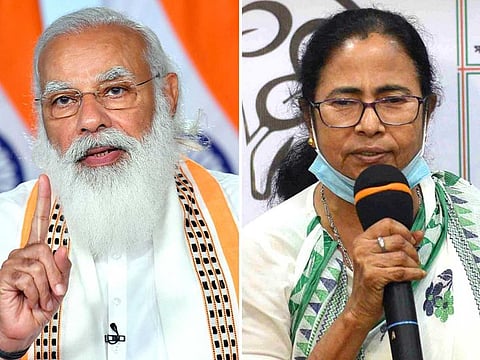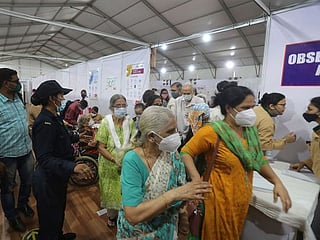Here is how the Bengal assembly elections will play out on May 2
Will Mamata Banerjee’s TMC win or Modi’s BJP? We give you a lowdown of both scenarios

Also In This Package
India’s ruling Bharatiya Janata Party (BJP) may have mastered the art of communication during election campaigns but if you discount its propaganda, you may be able to count the reasons for its actual strength on ground zero during the election battle.
During the assembly election of Bihar in 2015 and in Delhi elections of 2020, many political pundits have been victims of the BJP’s perception-building exercise.
Amit Shah, former BJP president and India’s current Home Minister, has often been criticised for his high-pitched and often noisy campaign but Shah’s scripting of a historic victory in the Uttar Pradesh election of 2017 where the BJP got 312 (out of 384 seats that the party contested) has compelled everyone to take his election-time claims very seriously.
Shah’s brilliant micro-planning to reach-out to castes and sub-castes got his party 265 more seats in the politically important state of India.
In the current election season, even if one discounts BJP’s high stakes campaign blitzkrieg, in West Bengal the incumbent Mamata Banerjee and her party Trinamool Congress are on the defensive. The BJP does seem tantalisingly close to unseating Banerjee, Bengal’s strongest leader.
Didi once again?
If Mamata wins the difficult battle, critics would be able to easily list out reasons behind her amazing victory. In that case, after the verdict it will be construed that:
a) Mamata Bannerjee’s regional appeal to the Bengali speaking masses has been able to checkmate the charisma of the Hindi-speaking Prime Minister Narendra Modi. As a result provincialism has trounced nationalism in the state.
b) It would be accepted that her fierce image of being the spirited fighter in the midst of a crisis did wonders. The BJP’s enormous resources and Amit Shah’s strategy to polarise voters couldn’t diminish Mamata’s raw emotional pitch.
c) If TMC wins then it will be more likely because of “insecure” women voters who find “known devils” of the TMC in their villages “safer” than connecting with largely unknown netas of the BJP.
d) Mamata’s “secular fight” to take on the formidable duo of Modi and Shah may have helped her retain the support of Bhadralok of urban areas. The anti BJP forces will find a different model to fight the BJP than the one offered by Arvind Kejriwal.
d) Most importantly it will be concluded that the BJP brand of aggressive and communal Hindutva has been rejected by the sophisticated secular Bengali voters. It would be claimed that the Muslim voters of Bengal have retained their strategic importance and helped Mamata protect the Bengali asmita that nurtures pluralism through Bengali language.
e) After Mamata’s victory, the critics of the BJP are likely to say loudly that, “overconfidence, arrogance and uncontrolled ambitions of the “power-drunk BJP” failed to achieve the set target to gain power in Kolkatta.” And, that the BJP overestimated the anti-incumbency against the TMC.
If Modi pulls a surprise
On the contrary if the BJP wins West Bengal, it will be an event that shall create a political earthquake in Delhi politics.
a) It will completely jolt the hard-core “secular liberal” critics of the BJP. The old Nehruvian edifice of “secularism” will crack further. Objective analysts would understand that in Bengal, BJP won’t be just changing the political set-up but the entire sociopolitical premise to administer the state.
b) The BJP victory will add to the aura around Modi. It will be seen with amazement that without declaring a chief ministerial candidate in a major non-BJP state, Modi can reach out directly to voters without speaking their language.
The entire galaxy of anti-BJP leaders and so-called secular-liberal elites and intellectuals would rethink their pet quote — “India is not Gujarat!”
c) Also, if the BJP registers a victory on the back of a religious slogan, the image of Amit Shah will be further buoyed. His career will move forward within the Indian polity and in his party. He will get credit for his in-depth understanding of the caste-identities, how people’s faith works and influences local politics and how powerless men and women search for safety and security in their villages and how it decides their voting patterns. The victory will be quintessentially different for Shah because unlike UP, Bengal wasn’t a traditional BJP or a Hindi state.
d) The BJP has forcefully emphasised the role of its Bengali founder Shyama Prasad Mukherjee in helping retain Kolkata in West Bengal during the Bangbhang movement before independence. It has been a work in progress. From 2017 to 2019 Shah’s team prepared around 20 points protocols to follow in each polling booths that included meeting local people, attracting women voters, religious sects and youth.
Maximum time, energy and attention was given in approaching, cajoling and tying up caste leaders like mantuas, Dalis, Santhalis, Kurmis etc with the BJP.
A BJP victory will bring with the bang the caste matrix in electoral politics and will give a body blow to the Brahminical dominance of Bengal politics. Instead of Bannerjees, Bhattacharyas, Rays and Basus, you will soon see new identities entering state politics.
e) Shah doesn’t believe at all that the only anti-incumbency against TMC or Mamata can win the BJP election. The BJP figured out the growing social and political influence of the minorities in rural areas and attracted Hindu voters, some of whom felt left behind in accruing the benefits of the government’s systems.
In 2019, when Mamata Bannerji lost temper publicly against the chanting of a religious slogan, the BJP found a solid plank. Modi-Shah grabbed the moment and became super aggressive.
BJP was able to contact and influence non-Bengalis of Bengal who reside in big numbers all over the state. In the event of a BJP win, non-BJP parties would have to overhaul their understanding and the strategy to fight Modi and Shah. By understanding the voters’ basic and sensitive demand for safety and security, Modi and Shah were able to convince voters that in a violence ridden and volatile society, they are safe only under the BJP. That’s how the party’s Bengal story would began.
There is a big ‘if’ in the above conjectures but one of the two scenarios will surely unfold on May 2, 2021. Watch this space.










